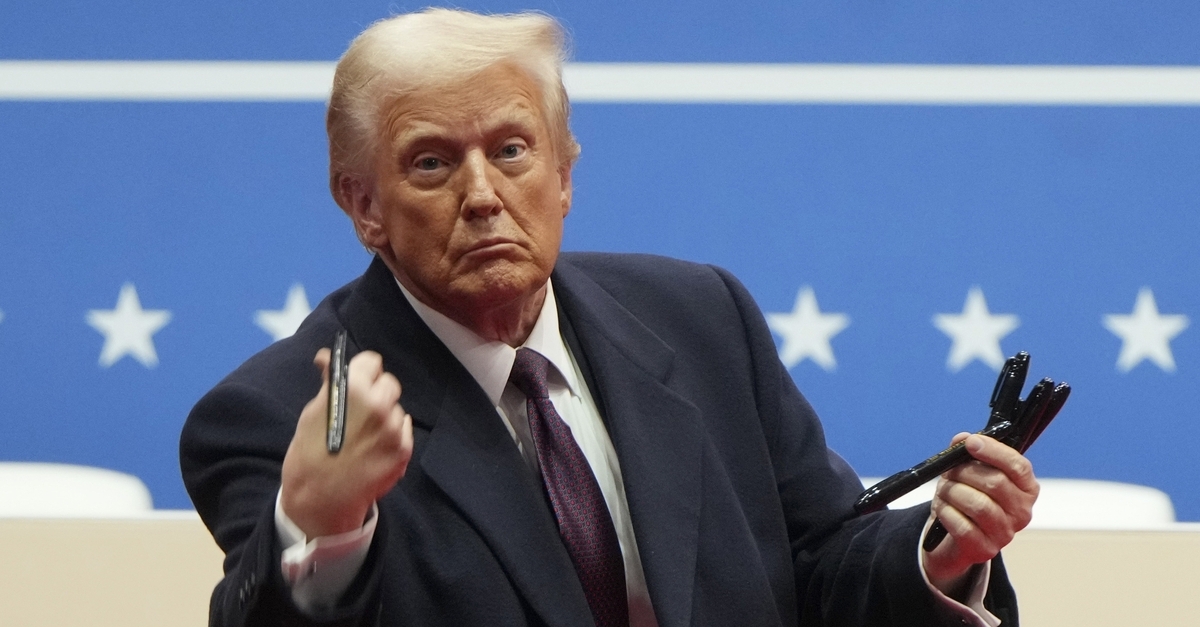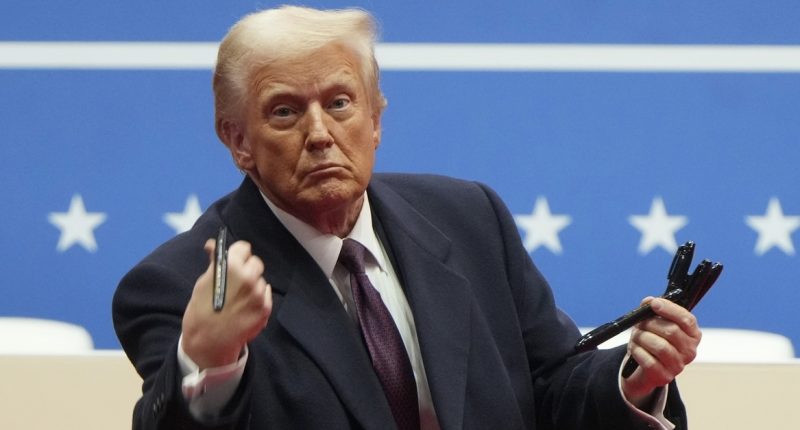
FILE — President Donald Trump throws pens used to sign executive orders to the crowd during an indoor Presidential Inauguration parade event in Washington, Monday, Jan. 20, 2025 (AP Photo/Matt Rourke, File).
The Trump administration on Tuesday announced a sea change in how media will be allowed to cover the presidency. That change was foreshadowed in a recent court filing — as part of a parade of horribles.
Standing behind a lectern and flanked by flags and screens in the James S. Brady Press Briefing Room, White House Press Secretary Karoline Leavitt said the government itself would henceforth select the journalists who make up the White House “press pool.”
The press pool is a nearly 144-year-old institution whose members have, for decades, been under the purview of the 111-year-old White House Correspondents Association, a nonprofit that is famously responsible for their annual, eponymous, comedy-themed dinner.
“As you all know, a group of D.C.-based journalists, the White House Correspondents Association, has long dictated which journalists get to ask questions of the President of the United States in these intimate spaces,” Leavitt intoned. “Not anymore. I am proud to announce that we are giving the power back to the people who read your papers, who watch your television shows, and who listen to your radio stations. Moving forward, the White House press pool, will be determined by the White House Press Team.”
Reaction from the WHCA, other members of the media, and First Amendment experts was swift and all-but uniformly negative.
“This move tears at the independence of a free press in the United States,” WHCA President Eugene Daniels said in a statement. “It suggests the government will choose the journalists who cover the president. In a free country, leaders must not be able to choose their own press corps.”
A White House adviser reportedly gloated, albeit anonymously, in comments to Axios — and attributed the press pool shift directly to a recent dispute with The Associated Press over certain terminology.
“The AP and the White House Correspondents Association wanted to f––– around,” the adviser told Axios. “Now it’s finding out time.”
Alex Morey, a First Amendment attorney who works for the Foundation for Individual Rights and Expression, criticized this perspective in a post on X (formerly Twitter).
“[A] media outlet holding firm to its editorial standards in the face of explicit pressure to instead act as the government’s mouthpiece is, if I’m remembering my J-school lessons accurately, the exact opposite of f–––ing around,” she said.
Leavitt clarified that “legacy outlets” who have been part of the pool in the past “will still be allowed to join,” suggesting one upshot of the new policy is other “well-deserving outlets” will be granted access.
“New voices are going to be welcomed in,” Leavitt said, explaining that major broadcast news networks will take part, on a rotating basis, with “streaming services which reach different audiences.”
The makeup of the pool will, going forward, be made by White House officials — and will likely change on a daily basis.
Still, the move will likely serve as a stark and powerful example of how some Trump administration decision-making appears calibrated specifically to deter and enrage its opponents.
The shift in how the press pool will be chosen comes amid an ongoing legal battle in the federal court system over the Associated Press’ access to the institution it essentially founded.
On Feb. 11, White House officials informed the AP its reporters would be barred from entering certain areas as a member of the press pool “unless the AP began referring to the Gulf of Mexico as the Gulf of America, following President Trump’s renaming of that body of water in Executive Order 14172,” which was titled, “Restoring Names That Honor American Greatness.”
On Feb. 21, the WHCA filed an 18-page lawsuit in D.C. federal court accusing the White House of engaging in “content- and viewpoint-based discrimination” in violation of the First and Fifth Amendments. The complaint, and an accompanying motion, requested a temporary restraining order — asking for the court to reverse the ban.
On Monday, U.S. District Judge Trevor McFadden, a Trump appointee, declined to grant what he termed the “extraordinary relief” of a temporary restraining order due to the timing of the lawsuit and because the AP can still access pool reports prepared by other journalists.
At the same time, the judge mused that precedent was wholly on the plaintiffs’ side when, and if, the case comes down to the merits. To hear the judge tell it, the ban on the AP was clearly unconstitutional.
“It seems pretty clearly viewpoint discrimination,” McFadden said.
A 21-page amicus brief filed on Monday by the Reporters Committee for Freedom of the Press staked out the exact same position.
“Here, the AP’s exclusion is not just arbitrary and unjustified but viewpoint-based, an ‘especially invidious’ form of discrimination often described as ‘poison’ to the free flow of information,” the brief argues. “To tolerate it in this case would undermine the central meaning of the First Amendment and the central purpose of the White House pool — to ensure that the public ‘never come[s] to depend on a president’s aides alone’ to understand the nation’s highest office.”
The filing elaborates on how the First Amendment likely applies in the case of the AP being singled out and ejected from what is, in terms of constitutional caselaw, considered a “public forum.”
Love true crime? Sign up for our newsletter, The Law&Crime Docket, to get the latest real-life crime stories delivered right to your inbox
“Having implemented the pool system, then, the White House may not, consistent with the First Amendment, bar access to pool members on grounds that are repugnant to the principle of viewpoint neutrality,” the brief goes on. “And here the White House makes no secret of its motivation. It excluded the AP because it is targeting the substance of the AP’s reporting, which it perceives as ‘partisan.””
The brief also makes a public policy argument — premised on the idea that the press pool’s membership is self-regulated.
Again the friend of court filing, at length:
As a matter of longstanding policy, “[t]he White House does not pick the members of the press pool that goes in to the Oval Office” and other limited-access spaces; instead, to preserve the pool’s function as an independent chronicler of the presidency, “[t]he pool makeup is decided by the members of the press corps themselves.” And that independence is jealously guarded …
That longstanding policy, of course, is precisely what the White House put out to pasture the very next day.







